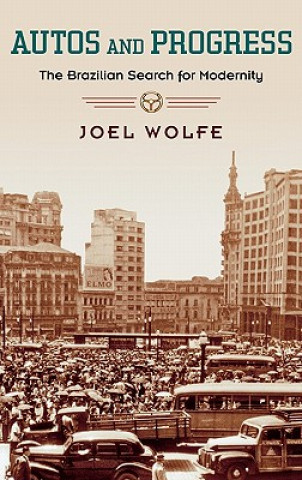
Kód: 04516383
Autos and Progress
Autor Joel D. Wolfe
Autos and Progress studies the automobile as both a tool and a cultural symbol of Brazil's status as a modern "developed" nation. As such it addresses debates on state-making, the role of multi-national corporations in the region, ... celý popis
- Jazyk:
 Angličtina
Angličtina - Väzba: Pevná
- Počet strán: 288
Nakladateľ: Oxford University Press Inc, 2010
- Viac informácií o knihe

Mohlo by sa vám tiež páčiť
-

Prehistoric Native Americans and Ecological Change
72.85 € -

White Tiger, Green Dragon
12.54 € -4 % -

My Donkey Body
14.06 € -10 % -

West End Girls
12.44 € -13 % -

All About Short Selling
29.84 €
Darujte túto knihu ešte dnes
- Objednajte knihu a vyberte Zaslať ako darček.
- Obratom obdržíte darovací poukaz na knihu, ktorý môžete ihneď odovzdať obdarovanému.
- Knihu zašleme na adresu obdarovaného, o nič sa nestaráte.
Viac informácií o knihe Autos and Progress
Nákupom získate 301 bodov
 Anotácia knihy
Anotácia knihy
Autos and Progress studies the automobile as both a tool and a cultural symbol of Brazil's status as a modern "developed" nation. As such it addresses debates on state-making, the role of multi-national corporations in the region, middle-class consumerism, working-class politics, and sports and leisure in the crafting of national identity, among others. Such a study is key for understanding the twentieth century because auto-based transportation became the central facet of Brazilian attempts to gain control over its massive national space. The most obvious expressions of this include the building of Brasilia to be the new, interior national capital, the extensive road building throughout the Amazon in the 1970s, the nation's development of one of the world's leading alternative fuel industries, Brazilian dominance in world Formula One racing, and the fact that the current president, Luiz Inacio Lula da Silva, is a former auto worker and trade union leader. This focus on Brazilians' fascination with automobiles and their reliance on auto production and consumption as keys to their economic and social transformation, explains how Brazil -- which enshrined its belief in science and technology in its national slogan of Order and Progress -- has differentiated itself from other Latin American nations. This embrace of automobility allowed the Brazilian elite to use industrialism and the increased mobility of an auto-based society to attempt to remake the nation's poor into a more homogeneous population. Autos and Progress engages key issues in the Brazil around the meaning and role of race in society and also addresses several classic debates in Brazilian studies about the nature of Brazil's great size and diversity and how they shaped state-making. Autos and Progress unifies Brazilian economics, politics, and culture in the twentieth century. It provides a unique historical context for understanding Brazilian modernism in politics and culture. Moreover, by analyzing the origins of auto-oriented industrialism and consumerism, the book is an economic, cultural and social history of Brazilian attempts to remake the nation into a middle-class democracy. This aspect of the study presents a new interpretation for the rise of Brazil's New Unionism, which was born in Brazil's auto, truck, and bus factories. It also provides important context for understanding the place of the Partido dos Trabalhadores (Workers' Party) in national politics and culture, and the rise of President Luiz Inacio Lula da Silva, a former auto worker.
 Parametre knihy
Parametre knihy
Zaradenie knihy Knihy po anglicky Humanities History Regional & national history
120.52 €
- Celý názov: Autos and Progress
- Podnázov: The Brazilian Search for Modernity
- Autor: Joel D. Wolfe
- Jazyk:
 Angličtina
Angličtina - Väzba: Pevná
- Počet strán: 288
- EAN: 9780195174571
- ISBN: 0195174577
- ID: 04516383
- Nakladateľ: Oxford University Press Inc
- Hmotnosť: 525 g
- Rozmery: 243 × 161 × 23 mm
- Dátum vydania: 04. February 2010
Obľúbené z iného súdka
-

Hundred Years' War on Palestine
12.13 € -23 % -

Ethnic Cleansing of Palestine
12.84 € -23 % -

History of Japan
16.99 € -15 % -

Ten Myths About Israel
13.45 € -14 % -

Strange Death of Europe
15.27 € -20 % -

Decline and Fall of the Roman Empire
6.06 € -18 % -

Secret History
13.85 € -19 % -

God's Playground A History of Poland
68 € -

Mayflower
15.57 € -23 % -

How to be a Victorian
14.26 € -23 % -

Plantagenets
13.35 € -28 % -

General's Son
20.43 € -2 % -

Iran: A Very Short Introduction
10.01 € -22 % -

Temples of Karnak
151.99 € -

Cuneiform
11.02 € -23 % -

Twenty Years A-Growing
10.01 € -22 % -

History of Witchcraft in England from 1558 to 1718
18.81 € -

China in Africa
37.03 € -

Islandman
10.01 € -22 % -

Bohemian Paris
16.59 € -17 % -

Lancaster And York
22.66 € -

Alexiad
17.80 € -19 % -

Modern France: A Very Short Introduction
11.43 € -19 % -

Inside Hitler's Greece
20.84 € -20 % -

Diana: Her True Story - In Her Own Words
11.02 € -23 % -

The Fourth Turning
19.52 € -7 % -

The Oxford History of Ancient Egypt
15.27 € -23 % -

Churchill: The Power of Words
15.37 € -20 % -

Palestine
20.23 € -20 % -

Korean History in Maps
27.92 € -9 % -

Great Gatsby (Wisehouse Classics Edition)
16.18 € -36 % -

Viking Way
45.73 € -7 % -

The Thirteenth Tribe
14.77 € -

My Promised Land
18.41 € -

Vanished Kingdoms
19.02 € -21 % -

Age Of Revolution
16.38 € -23 % -

Life and Death of Anne Boleyn
23.37 € -2 % -

Coming of the Third Reich
18.51 € -23 % -

Children of Ash and Elm
18.51 € -23 % -

Europe Between the Oceans
34.20 € -6 % -

Socialism Betrayed
19.32 € -19 % -

303 Squadron
18.51 € -23 % -

Ancient Celts, Second Edition
26.50 € -19 % -

Dancing in the Glory of Monsters
16.18 € -19 % -

Battle of Britain: Luftwaffe Blitz (Images of War)
25.59 € -1 % -

Age of Confucian Rule
35.61 € -

Beyond Band of Brothers
16.38 € -23 % -

Benjamin Franklin
18.71 € -12 % -

On China
17.19 € -20 %
Osobný odber Bratislava a 2642 dalších
Copyright ©2008-24 najlacnejsie-knihy.sk Všetky práva vyhradenéSúkromieCookies



 21 miliónov titulov
21 miliónov titulov Vrátenie do mesiaca
Vrátenie do mesiaca 02/210 210 99 (8-15.30h)
02/210 210 99 (8-15.30h)